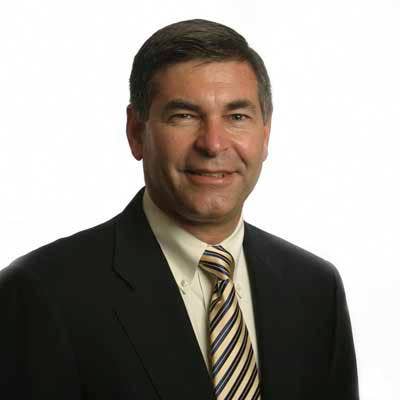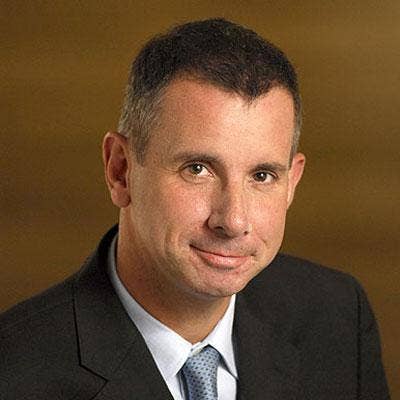Q&A: Symantec CEO On Split, New Security-Focused Channel Vision And Apple Vs. FBI

Brown Talks Symantec Post Split
It's only March, but 2016 has already been a busy year for Symantec. The security vendor completed its split from information management business Veritas, landed a $500 million investment from Silver Lake, and continued the rollout of new products and a revamped partner program. The last time CRN caught up with CEO Michael Brown was before the company's split in October. We reconnected with him at the recent RSA Conference in San Francisco to get up to speed on how all of these changes at the security vendor will affect partners, as well as to catch his thoughts on recent competitive changes and the Apple vs. FBI debate. Take a look at what he had to say.

The last time we talked was before the split. Can you give us an update?
We're excited about the changes that have occurred. At that time, we were still planning for the split. Now it has occurred, and for the first time in a decade, we are completely focused as a company on security. We had been targeting that milestone for some time. … We're very excited about the strategic investment from Silver Lake as well, because I think that's an external validation that the transformation or turnaround at Symantec is on track. … We didn't necessarily need the half a billion dollars that they brought, but what that allowed us to do was have an even better return to shareholders -- I think, the validation of what we're doing and then their help with some of what we need to do going forward, which is reduction in cost and potential M&A. … I think that will really help us with this next phase of what we need to get done.

The split was a huge milestone for Symantec, but not the end of the turnaround. What comes next?
Going back to the beginning, it was important to do a long-term strategy for the company, which for security means Unified Security. … It was important to figure out what the structure of the company would be, going from a strategy to saying we will focus on security. That started with the separation from Veritas. … We decided to go to business units, so now we have a consumer business unit and an enterprise business unit. … Specifically on the consumer business unit, it was, "How do we change the business model and move all of our customers to a subscription service from the cloud?" We took nine different offerings, and now customers have a choice of one service -- it's much more economical. … The profitability is up dramatically, from about 43 points of operating margin to 56 in the last quarter. It's a huge increase in the strength we see underlying the consumer business.

But the enterprise business hasn't seen that same trajectory, according to your earnings reports.
I would say enterprise was an even more difficult part to the turnaround. … On the enterprise side, there was a very fragmented product line that needed refreshing. We decided that we wanted to focus on organic product development. A lot of Symantec's history is outsourcing innovation through acquisition. We are still looking at M&A. … Things that we're doing with the product line are more integration … orchestration … and cloud. … We're at the front end of seeing the benefits of that. We started it a year ago. … We have 12 new products coming in enterprise security, the first three of which are ATP, which launched in December. … We're excited about where we are, but we're really just beginning this phase, that is, delivering the new products that benefit from the Unified Security strategy.

What's the next step in the enterprise strategy for Symantec?
This next part of the turnaround is seeing those products get into the market and seeing customers take them, take six to nine months to evaluate, and then start to uptake with those new products and building that pipeline out, which includes what we're doing with our channel. Those are the key activities in this next part of the turnaround that we're focused on. This upcoming fiscal year, which starts April 1, will be the third year of this transformation or turnaround of Symantec. It's had a very methodical set of things that we needed to do in each phase, and I feel good about where we are.

Where does acquisition fit into this strategy?
If we think about, "Where do we play in the security market?" -- threat protection, a big part of our business is keeping the bad guys out; information protection, which is where we think we're leading in the marketplace based on the strength of DLP, ... and then cybersecurity services. If we look at M&A, it will be in one of those three areas. We don't view ourselves as a roll-up. We're not trying to cover every space in security -- that would be impossible for us to do, even as the largest security company with a lot of resources. We want to be leading in each one of those three segments.

How does Silver Lake fit into your acquisition strategy?
It would be good to get their thinking. They would bring more of a financial perspective. We would probably bring more of an industry perspective to potential acquisitions. It's good to have both of those. They also have extensive due diligence capabilities, because that's all they do is look at companies and decide what's worth investing in. They have some expertise on their team that knows the security industry -- in fact, one of their operating partners is the former CTO of Symantec who was with us over a decade ago.

We've talked a lot about companies you might buy. Would you ever consider getting bought yourselves?
If you're a public company, you can never rule that out. It would obviously take a much bigger player to think about that -- someone who is big in the systems or software world that wanted to have a security play. I don't spend time worried about that. We need to spend time worrying about what do we do to make Symantec more successful.

What is the new channel vision with the split?
We launched a new channel program [called SecureOne] this fall at Partner Engage.… It's early on, but this was a change to get our partners excited about what we're doing. It's not just a need to feel good about the future, but really a chance to get them much more deeply integrated into what we are doing going forward. I think the reaction was overwhelmingly positive. … We heard things like "Symantec is back" and "This is what we remember -- Symantec taking a leadership role in the industry." … The key components for the SecureOne program are making sure the incentives for the channel get aligned with those partners who are spending the time investing with us. … The incentives are also easier to get to, so we made some changes to make the program a little less cumbersome than in the past. … We will support the channel going forward with additional resources to make sure we can build that business. It is early days, but … we're excited to see what they can do.

What about the many channel leadership changes? Can you address that?
The biggest leadership change was our worldwide sales leader Adrian [Jones] (pictured)…But we're very confident in our team. Our worldwide sales leader John Sorensen has been a veteran for a decade. He knows a lot of our channel partners as well as enterprise selling…We've also got some pretty experienced channel leadership too in John Thompson, who continues to lead our channel work. We're confident we have the right leadership, the right program and the right products that are coming. It's just a matter of executing now for us.

Can we expect more channel changes to come?
I'm sure we will be making some additional improvements so we can better support the channel as we get experienced with them and the SecureOne program. We're three-quarters in to a dedicated, security-focused sales and marketing and channel team. Before that, the channel had to include Veritas. We think we're going to get better and better at this. We're three-quarters in. We like what we see. We're better in the December quarter than we were in the September quarter and that's something that we will improve over time.

Is the focus on recruiting new partners or bringing current partners into your new channel vision?
I just met with a channel partner here [at RSA] whose business has grown more than 100 percent with us this year. What we need to do is be targeting more partners like that who take the time to understand the program and want to be focused on security. I think before we probably were less focused on those partners who concentrated on security. Now, that's going to be one of our focuses on who we want to work with. That may imply we will do some tweaking or self-selection, because if folks are not focused on security and we're just one part of a broad portfolio they won't have the same level of incentives and have gone through the same level of certification. It's about working more closely with the partners who want to focus on us.

Can you give us an update on ATP? That was a big launch in the fall.
Many of us are involved in the ramp of ATP, which we're really excited about what we're seeing. That product just went into general availability in mid-December, but we're already seeing it book some revenue in the December quarter. That will be up an order of magnitude in the March quarter. We have over 350 customers evaluating ATP right now. We have over a dozen wins already. One customer, which is a pretty large customer with 10,000 endpoints, has bought all three modules: endpoint, network and email. They're seeing the benefit of the integrated view of the threat environment. It's early days, but I think that's really going to help us.

Your competitor Intel Security has a new strategy – how does that affect Symantec?
We've competed against Intel Security/McAfee now for decades. I think they are about half the size that we are. We take them, as we do all competitors, seriously. But, I would say that what they announced doesn't change how we see the future, how we go to market and our roadmap. If we can execute on our own strategy, now I think the focus will help us with that, then we will be doing great in the market place. I don’t want to say I don’t think about competitors, because I do, but we just need to execute on what we have in front of us. We have an incredible customer base, with more than 370,000 enterprise customers. If we can just deliver for them the promise of these new products, I think we will see the enterprise business do quite well.

What do you think of the whole Apple-FBI deal?
Since encryption is part of our portfolio, we're strong believers in encryption. Privacy and security we view as flip sides of the same coin. You can't have privacy without having strong security. We are big believers in encryption. We would think a "backdoor" is a terrible idea, because once you create that, you don't know whether good guys are using that or bad guys are using that. We would oppose any efforts to create backdoors in the software.

How does the Apple-FBI debate play into Symantec?
I would say that we take a balanced approach. That's an important tenet for us: strong encryption and strong privacy. We also support law enforcement. It's a little different mission than some of the other companies that are active in this debate. I view Symantec has having a dual mission. One is selling products and services to secure customers -- that's obvious. The other mission that we take very seriously is supporting law enforcement. We're often involved in some of the activity to take down criminal activity, whether it's botnets, or financial Trojans or ransomware. … We have very close relationships with the FBI, Europol, on and on, because part of our mission is to make the digital world a safer place. Doing that means we have to work closely with law enforcement. That doesn’t mean we would support backdoors or weak encryption, but we also want to have those collaborative relationships to go out and get bad guys. We are in a unique position and we think that does a lot of good for society.

You have a broad vision of where you're going to go. What can partners expect in the next 30 days, 90 days and in the next year?
I think we hope partners will continue to invest in us and make SecureOne pay for them as we deliver these new products over the next few quarters. That will present a lot of opportunity for them. We're excited about working with the channel partners who want to focus on our business, take the time to invest in us and develop a pipeline. Channels will be a key part of that for us. Eighty percent of our revenue goes through the channel, so we have to do this collaboratively through them. Together, we should realize some success from this focus on security, this wave of organic innovation that's coming from enterprise security and then we can grow together. They're interested in that and we are too.